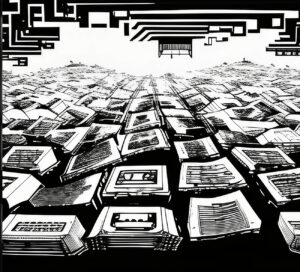Decentralized Identity Services
This short article was contributed by Humpty Calderon, head of neighborhood at Ontology.
Over the last number of years, the videogaming market has actually experienced amazing development. Expanding 23% in 2020 from the year previous, its combination with blockchain has actually seen play-to-earn and crypto designs skyrocket in appeal.
Against this background, lots of players and designers are doubtful about the advantages that blockchain can bring to videogames, leading to current reactions versus some studios that are incorporating NFTs. Tangible usage cases that display the advantages and services that blockchain can bring will be essential for showing that this innovation can improve what gamers currently understand and love about videogaming.
Through back ending videogames with blockchain innovation, consisting of decentralized identity (DID) services, gamers can genuinely own and get rewarded for their in-game properties in a method that hasn’t been possible previously. In doing so, they are connected to a safe, safe and secure online identity that will be portable throughout numerous various virtual worlds.
Blockchain enables studios to take the gaming world to an entire, brand-new level. It can aid guarantees that in-game products are traceable and that the worth they hold isn’t simply locked inside a videogame. Tying blockchain to in-game products such as weapons, skins, and other antiques allows them to maintain a new, distinct kind of worth, while likewise guaranteeing that worth remains safe. This implies that if a videogame is ultimately erased or offered to another business, gamers can constantly maintain their worth. By connecting a digital record of an property to a individual’s decentralized identity, gamers can show that they own the product and can bring that record out of one videogame if required. In this method, DID can assist in interactions in between various blockchain-based videogames to deal a varied variety of advantages for gamers.
[SS]DID services are blockchain facilities that can back-end a videogame in order to confirm gamers’ identities, validate traceability and credibility of their in-game properties, and eventually boost gamer security. As the videogaming market grows, so does the hunger for verification of ownership of in-game items like treasures, trading cards, and other mission products that can be gathered, and blockchain can assistance users to fulfill these requirements.
We have actually seen uniqueness ending up being progressively crucial for Gen Z, who make up a big part of the videogaming neighborhood. According to reports, 87% of Gen Z play video videogames, with 65% having invested cash on virtual products within a videogame in2021. Through connecting a record of ownership to an immutable journal on blockchain, gamers can genuinely show that they own these products, making the procedure of exchange much clearer and more safe and secure.
Players typically trade in-game products such as skins, lives, and abilities through online forums, social channels, and commerce platforms. The factor they pick to do so outside of the videogames themselves is that numerous videogames do not make it possiblefor the exchange of products for genuine currency nor do they have the facilities to genuinely validate products. Easy-to-navigate, fast KYC checks utilizing DID are one choice that can be utilized in videogames to make it possible for reasonable exchange and safeguard gamers from frauds and other malpractice. This indicates that gamers who are trading can validate their identity, while staying mindful of the authenticity of the individual they are dealing with. What’s more, if gamers choose to take themselves out of the videogaming economy to trade through social channels or online forums, they can still demand DID confirmation to show the authenticity of who they are trading with. Thus making sure that they are safe both in and out of the game.
Web3 will ultimately make it possible for gamers to effortlessly traverse in between various videogames and virtual worlds that make up the metaverse. In practice, what this might suggest is a gamer would be able to take their avatar from a videogame like Call of Duty and bring it into World of Warcraft to total a mission. There, they may purchase a sword and later on sell it to a gamer in Decentraland, where they might usage cash to buy a virtual plot of land. The possibilities are unlimited however in order for this to ended up being a truth, gamers requirement to have an interoperable digital identity that will enable them to traverse through numerous virtual worlds with a constant identity consisting of their wallet, possessions, and individual info. Decentralized identity makes it possible for this.
DID options likewise mean that gamers own and have complete control over their own individual information, allowing them to log in firmly to various systems without exposing their personal details. This level of security is a essential aspect for videogaming, making sure that every deal within a videogame is proven, safely tape-recorded and kept, and most significantly cannot be modified. Players put numerous hours into structure their videogaming profiles, abilities, and gathering products.
[SS]DID can aid players to protected these videogaming possessions while likewise safeguarding their personal privacy and preserving their important time. Solutions are developed to permit gamers to develop a more powerful variation of their online identity and with total control, the DID holder can choose what info they pick to share with a personal essential that grants gain access to to the confirmed user just.
With the worldwide videogaming market set to reach $250B by 2025, the cravings from gamers looking to genuinely own their in-game possessions and hold a safe interoperable identity throughout several virtual worlds will just boost. Decentralized identity can construct an completely brand-new environment of real ownership within video videogames, whilst including security, safeguarding personal info, and including trust. This would change the whole market for the much better, producing a more transparent arena where gamers can rest guaranteed that their properties and genuine and virtual identities are safe. If made use of properly, decentralization will shape the future of videogaming.
Humpty Calderon is head of neighborhood at Ontology.





